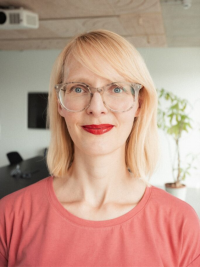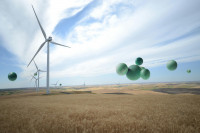Seismograph for a sustainable economy - How a return to true entrepreneurial spirit can help us move forward
by Paul End
„Necessity is the mother of invention.” Is it?
More and more, the impression is growing that this old saying is losing its validity. Necessity does not seem to be the mother of invention at the moment. At least not in the entrepreneurial sense. Yet there is no lack of necessity: the multitude of crises is affecting us on a personal, social, economic and organizational level. Our 'world' - accelerated by technological developments such as AI - is no longer just complicated. It is complex. Very complex.
Many companies, especially in Germany, are responding to this complexity with a clinging reflex: consistent adherence to the (economic) success models of recent decades. The spirit of invention only flashes when it comes to increasing their efficiency. However, in a global, increasingly digital world, this kind of progress is nothing more than 'standing on the spot'. At best.
Progress through reflection
Instead, it is a return to the past that managers can use to move their companies forward in these times. A return to the basic virtues of entrepreneurs: Picking up and implementing new ideas, creatively combining 'productive forces', breaking up existing structures and creating new ones. Being responsible for dynamics in the organization and in the market instead of 'only' reacting to current market dynamics. In short: being the cause - and not the plaything - of change.
Managers do not have to be inventors first and foremost. But they should focus their energy on tracking down new ideas, learning from them and transferring them to their own corporate context instead of dismissing them as fantasy, utopia or ideology. Their mission: to become a seismograph for the future viability of their own business activities.
But how exactly?
A good starting point can be to look at other companies. From other sectors. From other countries. The small and not so small companies that are already demonstrating the opportunities and potential of key growth levers for sustainable business - organizational set-up, brand and business model.
Companies such as Rebel Energy, a fast-growing start-up in the UK, which is characterized by its progressive organizational set-up and is now one of the most popular employers in the UK. Driven by their ambition to combine green energy with social issues, they have implemented a role-based organizational model that promotes decentralized decision-making, self-organization and cross-functional collaboration.
In addition to start-ups, it is also worth taking a look at the big players: the first Tesla Supercharger Diner is due to open in West Hollywood at the end of 2024. A retro-futuristic idea that combines the US tradition of 1950s drive-ins and diners with future technologies. Gastronomy and entertainment offerings are intended to provide a special brand experience when charging electric cars.
Another company that should be on your radar is ECOALF. The sustainable fashion company produces high-quality clothing from recycled materials such as plastic from the ocean, used tires and coffee grounds. While many are still theorizing about circular business models, ECOALF has already put them into practice. For 15 years, with growing success. Sales growth of 25% is forecast for 2024, when new stores are due to open on several continents, and the company, which was founded in Madrid, is aiming for annual sales of over 150 million euros by 2027.
It is these or similar success stories that show how sustainable business can (already) function today. They allow us to take a critical look at our own business-as-usual. They make it easier for us to form images of the future. Of how we want to live, work and do business in the future. That give us courage. That make us more courageous.
And inventive.
We are happy to receive project inquiries



